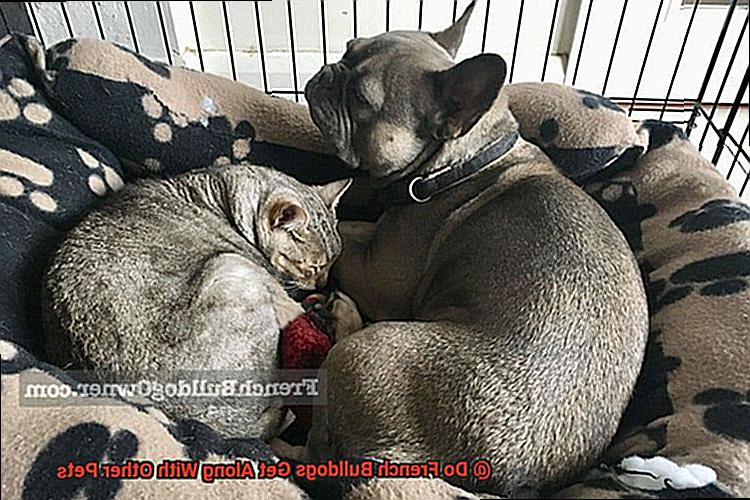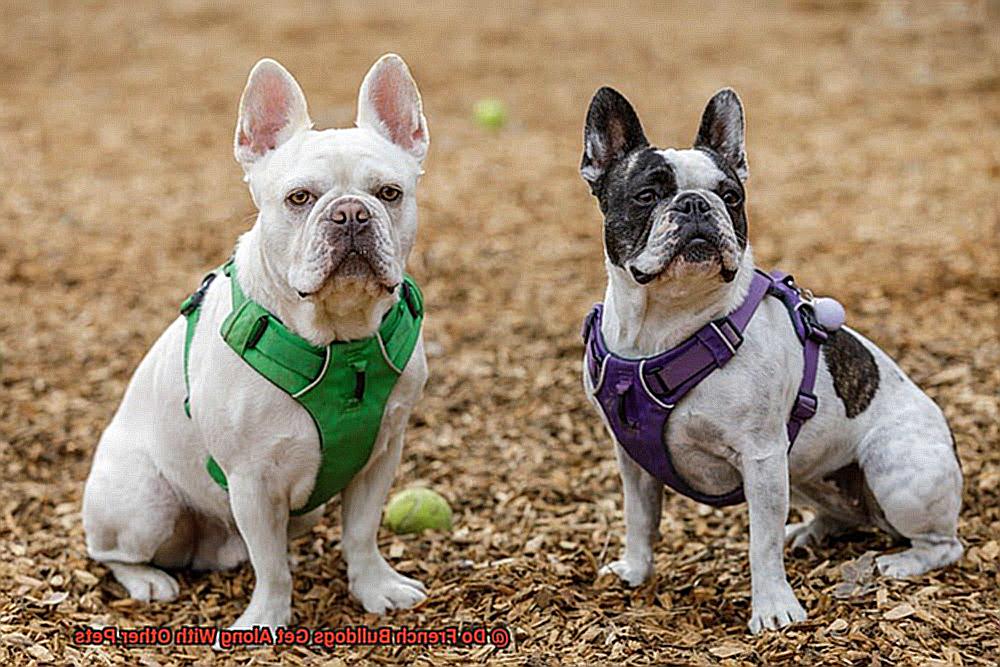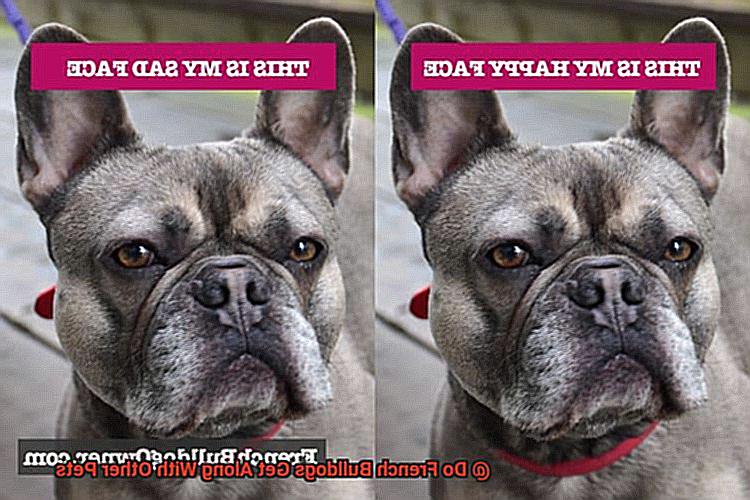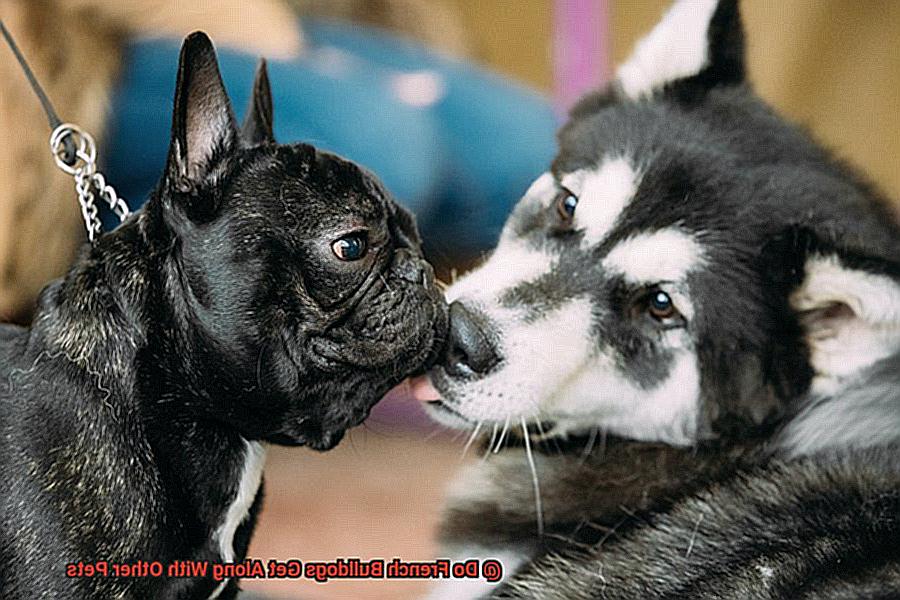Do French Bulldogs Get Along With Other Pets?
Thinking about bringing a French Bulldog into your fam?
But, hold up – you might be wondering, “Will my other pets get along with this squishy-faced cutie?”
Totally valid concern. After all, we all want a chill and happy household for everyone – humans and animals alike.
Whether you’ve got cats, dogs, or even tiny critters, let’s find out if these little nuggets are ready to form some pawsome friendships.
The Benefits of Early Socialization for French Bulldogs
Contents
- 1 The Benefits of Early Socialization for French Bulldogs
- 2 French Bulldogs’ Playful and Affectionate Nature
- 3 Tips for Introducing French Bulldogs to Other Pets
- 4 Understanding the Potential Issues with Size
- 5 Analyzing the Temperament of Other Animals
- 6 Establishing a Harmonious Relationship with Other Pets
- 7 Monitoring Interactions to Prevent Conflict or Aggression
- 8 Best Practices for Multi-Pet Households with French Bulldogs
- 9 Conclusion
It is essential to understand the importance of early socialization for these adorable dogs to ensure positive relationships and interactions with other animals. In this blog post, we will explore the benefits of early socialization for French Bulldogs and provide practical tips for introducing them to different pets.
Development of Positive Relationships:
Early socialization allows French Bulldogs to develop positive relationships with other pets, such as cats and dogs. By exposing them to various animals from a young age, they become familiar and comfortable with their presence, reducing the likelihood of fear or aggression later on. This helps create a harmonious and peaceful environment in multi-pet households.
Learning Good Manners:
Socializing French Bulldogs early on teaches them good manners and appropriate play behavior when interacting with other pets. Through positive experiences and guidance, they learn how to communicate effectively and resolve conflicts peacefully. This sets a solid foundation for well-rounded and well-behaved behavior throughout their lives.
Confidence and Adaptability:
Well-socialized French Bulldogs are more likely to be confident, friendly, and adaptable when meeting new animals. They have learned to navigate different social situations, which can help reduce anxiety or fear when encountering unfamiliar pets in the future. This instills a sense of confidence in them, making them more comfortable in various settings.
Prevention of Behavioral Issues:
Early socialization can prevent behavioral issues such as separation anxiety or excessive barking that may arise from fear or insecurity around other pets. By exposing French Bulldogs to different animals during their critical developmental period, they learn how to cope with new experiences and adapt to different environments more easily.
Enriched Daily Life:
Having a well-socialized French Bulldog can greatly enrich their daily life as well as the lives of other pets in the household. They can engage in mutual play, exercise, and companionship, creating a positive and stimulating environment for all pets involved. This promotes mental and physical well-being, reducing the likelihood of boredom or destructive behavior.
French Bulldogs’ Playful and Affectionate Nature
These adorable dogs are known for their social skills and their ability to form strong bonds with both humans and other animals. In this blog post, we will explore how their playful and affectionate nature helps them get along with other pets, providing insights based on first-hand experiences and expert knowledge.
Social Butterflies: French Bulldogs thrive on companionship
French Bulldogs have a natural inclination towards socializing, making them highly adaptable to living with other pets. Their friendly and sociable nature allows them to connect with different animals, creating a harmonious environment filled with love, play, and mutual understanding.
Interactive Play: Building bridges through fun activities
One of the key aspects of French Bulldogs’ playful nature is their love for interactive play. Whether it’s chasing a ball or engaging in a friendly game of tug-of-war, these furry companions are always up for some fun with their fellow pets. This shared activity helps foster positive relationships and strengthens the bond between pets.
Early Socialization: The foundation for successful pet interactions
Introducing French Bulldogs to other pets at an early age lays the groundwork for positive relationships. Gradual introductions under supervision allow them to become familiar with each other’s scents, sounds, and behaviors. This process helps prevent any potential conflicts and ensures a safe and enjoyable interaction between pets.
Training and Positive Reinforcement: Teaching good manners
While French Bulldogs are generally well-suited to getting along with other pets, proper training and positive reinforcement play a crucial role in teaching them appropriate behavior. Through consistent training methods that focus on rewarding good behavior, French Bulldogs learn how to interact respectfully with their furry companions.
Individual Personalities: Embracing uniqueness
It’s important to remember that each French Bulldog has its own unique personality. While most French Bulldogs are sociable and friendly, there may be variations in their behavior towards other pets. Some individuals may display dominant or territorial behavior if not properly socialized or if they feel threatened. Understanding and respecting these individual differences is vital to maintaining a peaceful coexistence among pets.
Tips for Introducing French Bulldogs to Other Pets
Bringing a new pet into your home is an exciting time, but it can also come with some challenges. If you’re considering introducing a French Bulldog to your existing furry family members, it’s important to make the process smooth and stress-free for everyone involved. In this article, we’ll explore some helpful tips for introducing French Bulldogs to other pets, ensuring a harmonious and happy household.
Take it Slow and Steady:
When it comes to introducing French Bulldogs to other pets, patience is key. Start by allowing them to sniff each other’s belongings, like bedding or toys, to get accustomed to each other’s scent. This helps create familiarity and reduces anxiety during the face-to-face introduction.
Neutral Territory:
Choosing a neutral territory for the initial meeting can prevent any territorial behavior. A park or a friend’s house can be ideal locations where both pets feel comfortable and less likely to display aggression.
Short and Supervised Interactions:
Keep the first interactions short and under supervision. Gradually increase the duration as the pets become more comfortable with each other. This allows them to build positive associations and reduces the risk of any negative encounters.
Positive Reinforcement:
Rewarding calm and friendly behavior from both pets is crucial during the introduction process. Use treats, praise, and toys as positive reinforcement tools. This helps create positive associations with each other’s presence and encourages good behavior.
Separate Spaces:
Providing separate spaces for each pet is essential to prevent any competition or territorial issues. Each pet should have their own feeding area, bed, and toys. This ensures they have their own safe zones where they can retreat if they feel overwhelmed.
Consistency is Key:
Consistency plays a vital role in the successful integration of French Bulldogs with other pets. Stick to a routine and provide plenty of opportunities for positive interactions. This helps establish a sense of stability and familiarity, reducing any potential conflicts.
Understanding the Potential Issues with Size
Introducing a new pet into your home is an exciting time, but it can also come with its challenges. When it comes to French Bulldogs, their small size can present potential issues when introducing them to other pets. In this article, we will explore these potential issues and provide tips on how to navigate them for a harmonious and happy household.

Vulnerability to larger pets:
French Bulldogs are small in size, weighing between 16-28 pounds on average. This makes them vulnerable to being injured or overwhelmed by larger pets, such as big dogs or even cats. It’s important to supervise interactions between your French Bulldog and larger animals and ensure their safety.
Unintentional harm caused by build:
Due to their stocky build and shorter snouts, French Bulldogs may unintentionally injure smaller pets, especially during rough play or when they become overly excited. Their brachycephalic structure can make it difficult for them to regulate their breathing during intense activities, potentially causing harm to other animals. It’s important to be mindful of their physical limitations and ensure they engage in safe and gentle play.
Territorial tendencies:
French Bulldogs have a tendency to be territorial and possessive of their owners or their living space. This possessiveness can extend towards other pets in the household, especially if they view them as competition for attention or resources. Proper socialization and training from a young age can help mitigate this behavior and promote positive interactions.
Instinctive prey drive:

It’s important to consider the size difference between French Bulldogs and smaller pocket pets like hamsters, guinea pigs, or rabbits. The instinctive prey drive of French Bulldogs may make it challenging for them to coexist peacefully with these smaller animals. Even if a French Bulldog does not have aggressive intentions, their natural instincts might kick in when they see these smaller creatures scurrying around, potentially causing stress or harm to the pocket pets.
Analyzing the Temperament of Other Animals
Welcoming a French Bulldog into your home is an exciting experience, but it’s essential to consider the temperament of other animals in your household. In this blog post, we will explore the compatibility of French Bulldogs with different animals and provide practical tips for successful interactions.
Dogs:
French Bulldogs are known for their friendly and sociable nature, making them generally compatible with most dog breeds. However, it’s crucial to assess the individual personalities of both dogs involved. Some dogs may be more dominant or territorial, which can lead to conflicts. Introduce them slowly and in controlled environments, allowing them to establish a positive rapport over time.
Cats:
French Bulldogs can often get along well with cats, particularly if they have been socialized from a young age. Still, it’s important to note that some French Bulldogs may have a higher prey drive, which can trigger chasing or bothersome behaviors towards cats. To foster a harmonious relationship, supervise their interactions initially and provide both pets with their own spaces and resources.
Small Animals:

When it comes to small animals like rabbits, guinea pigs, or hamsters, caution is advised. French Bulldogs possess a natural hunting instinct that may lead them to view these smaller animals as prey. For their safety, it’s best to keep them separated unless closely supervised. Always prioritize the well-being of your pets by preventing accidents or harm.
Birds:
Introducing birds to a French Bulldog requires extra caution due to their natural predatory instinct. Even if unintentional, the excitement or sudden movements of a French Bulldog can distress birds, especially smaller ones that may fit into their mouths. Maintain careful supervision and ensure separate spaces to guarantee the safety and well-being of both pets.
Reptiles:
Reptiles have distinct needs and behaviors compared to mammals, necessitating careful consideration when introducing them to a French Bulldog. While reptiles are generally not seen as prey, their presence can still cause stress to the reptile. Secure enclosures and keeping the reptile out of reach of the French Bulldog are crucial steps in maintaining a harmonious environment.

Establishing a Harmonious Relationship with Other Pets
French Bulldogs are known for their friendly and sociable nature, making them great companions for other pets. However, like any other breed, they may require some guidance and training to ensure a harmonious relationship.
In this section, we will discuss important tips and insights on how to introduce your French Bulldog to other pets and foster a positive bond.
Start Early:
Introducing your French Bulldog to other pets at a young age increases the chances of them forming a harmonious relationship. Puppies are more adaptable and open to new experiences, making it easier for them to get along with other animals. So, if you have other pets or plan to get more in the future, it’s best to start the introductions early.
Slow and Controlled Introductions:
When introducing your French Bulldog to other pets, it’s crucial to take things slow. Allow them to sniff each other through a gate or door before allowing direct contact. This initial interaction helps them become familiar with each other’s scent, reducing the chances of aggression or misunderstandings.
Supervise Initial Interactions:
During the first few meetings between your French Bulldog and other pets, it’s important to supervise their interactions closely. This ensures that any signs of aggression or dominance can be addressed immediately. By being present, you can prevent potential conflicts and guide their behavior towards a positive outcome.
Positive Reinforcement:
Positive reinforcement plays a vital role in establishing a harmonious relationship between your French Bulldog and other pets. Reward good behavior such as calmness, friendly gestures, and respectful interactions with treats or praise. This encourages your French Bulldog to associate positive experiences with their furry companions, reinforcing their bond.
Establish Routine and Schedule:
Creating a routine and schedule for feeding, exercise, and playtime for all pets involved can help reduce potential conflicts. By providing structure and predictability, you minimize the chances of jealousy or competition between pets. This also ensures that each pet receives equal attention and care, promoting a harmonious environment.
Socialization and Training:
Proper socialization and training are essential for French Bulldogs to get along with other pets. Basic obedience commands like “sit,” “stay,” and “leave it” can help manage their behavior around other animals. Exposing your French Bulldog to different environments, situations, and animals from an early age can also contribute to their ability to adapt and form positive relationships.
Seek Professional Help if Needed:
If you encounter persistent issues or signs of aggression between your French Bulldog and other pets, seeking professional help from a certified dog trainer or animal behaviorist is recommended. They can assess the situation, provide specialized guidance, and develop a tailored plan to address any behavioral concerns.
Monitoring Interactions to Prevent Conflict or Aggression
But like any breed, Frenchies have their own unique quirks and personalities that can sometimes lead to conflicts or aggression with other pets. That’s why it’s crucial to keep a close eye on their interactions to ensure a harmonious household. In this article, we’ll dive into some practical tips and strategies to help you monitor those interactions effectively.
Understanding Body Language:
Just like us humans, dogs have their own way of communicating their intentions. As a responsible pet owner, it’s essential to familiarize yourself with your French Bulldog’s body language cues. Look out for signs of discomfort or aggression, such as stiff body posture, growling, or showing teeth. By recognizing these signals early on, you can step in before things escalate and prevent any potential conflicts.
Establishing Boundaries:
Creating clear boundaries and rules for interactions is key. Start by introducing new pets to your French Bulldog in a neutral space under controlled circumstances. This allows them to become familiar with each other’s presence without feeling threatened or overwhelmed. Gradual acclimation processes can help ease the transition and promote positive associations between the animals.
Positive Reinforcement:
Rewarding desired behaviors is a powerful tool in shaping your French Bulldog’s interactions with other pets. When they display calm and friendly behavior, offer treats or praise to reinforce those positive associations. Avoid punishing or reprimanding either pet during interactions, as this can create anxiety or fear-based responses that may lead to aggression.
Exercise and Mental Stimulation:
Regular exercise is not only essential for your Frenchie’s overall well-being but also for managing their interactions with other pets. Providing ample physical activity helps reduce excess energy that could otherwise be channeled into aggressive behaviors.
Additionally, mental stimulation through interactive toys or puzzle games keeps your French Bulldog engaged and prevents boredom-related conflicts.
Best Practices for Multi-Pet Households with French Bulldogs
Introducing a new pet to your French Bulldog can be an exciting but sometimes challenging experience. French Bulldogs are generally sociable and friendly dogs, but like any other pet, they have their own unique personalities and preferences. To ensure a smooth transition and minimize conflicts in a multi-pet household, here are some best practices to follow:
- Gradual Introductions: Take it slow and allow the pets to get familiar with each other’s scents before direct contact. Start by allowing them to sniff each other through a closed door or baby gate. This helps to establish a sense of familiarity without overwhelming them.
- Supervised Face-to-Face Interactions: Once they seem comfortable with each other’s scents, you can proceed with supervised face-to-face interactions. Keep both pets on a leash during the initial meetings to have better control over their behavior.
- Separate Spaces and Resources: Give each pet their own space and resources to avoid potential conflicts over food, water, and sleeping areas. Provide separate feeding areas, water bowls, and sleeping spaces for each pet to prevent resource guarding behaviors.
- Consistent Training and Positive Reinforcement: Teach your French Bulldog basic commands like “sit,” “stay,” and “leave it.” Reward them for good behavior towards other pets with treats or praise. Consistent training and positive reinforcement techniques are key in ensuring peaceful coexistence.
- Regular Exercise and Mental Stimulation: Make sure your French Bulldog gets plenty of physical activity and mental stimulation. This helps to manage their energy levels and reduce the likelihood of behavioral issues.
- Monitor Interactions Closely: Watch for any signs of aggression or discomfort during interactions between your French Bulldog and the new pet. Signs may include growling, snapping, or stiff body language. If any issues arise, seek professional help from a dog trainer or behaviorist to address the problem effectively.
Remember that every pet is unique, and their compatibility with other animals may vary. While French Bulldogs generally get along well with other pets, there may be exceptions. Always consider the individual personalities and needs of each pet before adding a new animal to your household.
Conclusion
In conclusion, French Bulldogs have a reputation for being friendly and sociable with other pets.
They are known to get along well with cats, dogs, and even smaller animals like rabbits or guinea pigs. However, it is important to introduce them properly and provide proper supervision during the initial interactions.
With proper training, socialization, and a loving environment, French Bulldogs can form strong bonds with other pets in the household.




